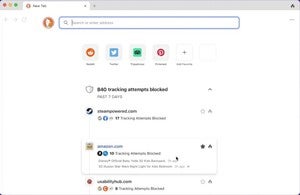































Privacy-centered search engine DuckDuckGo today launched the beta of its desktop browser for macOS.
The browser is designed from the ground up to maintain privacy, the company said, meaning it will not collect information about users and will not install cookies or tracking codes on devices. DuckDuckGo also said it can block "hidden trackers" before they load.
Duckduckgo first announced plans for a macOS desktop browser in December 2021. (The browser is already available as a download for mobile devices). In 2019, DuckDuckGo added Apple Maps support and has since made other improvements to how it works on Apple devices.
"Like our mobile app, DuckDuckGo for Mac is an everyday browsing app with privacy as the default through our built-in privacy protections like private search, tracker blocking, HTTPS upgrading, cookie pop-up management, and our Fire Button," Beah Burger-Lenehan, product director with DuckDuckGo said via email. "People want broad privacy protections, but in a convenient, easy-to-use package, so that's exactly what we built."
(Duckduckgo's so-called "Fire Button" is one-click tool to clear all data in a search window.)
 Duckduckgo
Duckduckgo Duckduckgo's privacy feed lets users see who wast trying to track you, lets you clear any stored data from websites you recently visited, and helps you navigate back to recent pages privately.
The browser's cookie pop-up protection works on about 50% of sites, the company said.
DuckDuckGo emphasized the browser isn't a replacement for Google Chrome's "Incognito mode." Instead, DuckDuckGo for Mac is designed for use as a routine, everyday browser.
To that end, the beta has features typical to other popular browsers, including password management, tab management, bookmarks, and privacy features.
DuckDuckGo is among a small number of privacy-oriented browsers, including Brave and Vivaldi.
"DuckDuckGo has a following, and that includes among Apple aficionados," said Jack Gold, principal analyst at research firm J. Gold Associates. "Even though Apple hypes its 'privacy,' there is still a lot of tracking going on. Duckduckgo really is attractive to those people who see any amount of tracking as an invasion of privacy. And it provides a way to stay 'almost' anonymous while you're browsing (nothing is 100%)."
Duckduckgo isn't likely to become a major browser for Mac users anytime soon, if ever, according to Gold. Most people are still comfortable using Apple's Safari browser and assume it offers a pretty private browsing environment, he said.
"It's really not that private, but probably a little better than Chrome," Gold said of Safari. "And most users probably won't go through the trouble of downloading and changing browsers. But that doesn't mean there won't be a significant number who will. So for Duckduckgo, this is a good move to show they are a complete, cross-device solution to private browsing."
While some browsers offer "privacy options" such as Chrome's Incognito mode (which turns off the function that saves cookies), a user's browsing history is still being recorded on the web through the IP address, according to Jon Callas, director of technology projects at the Electronic Frontier Foundation (EFF).
A year ago, DuckDuckGo partnered with the EFF to enhance secure browsing and protect user information on the web. The partnership resulted in the enhancement of DuckDuckGo's HTTPS Everywhere browser extension by incorporating rule sets from DuckDuckGo Smarter Encryption. The HTTPS Everywhere browser is a Firefox, Chrome, and Opera extension that encrypts user communications with many major websites, making browsing more secure.
In an earlier interview, Callas said that while his privacy-focused organzation does not endorse any products or browsers, DuckDuckGo has "done a lot of work to improve the privacy aspects of searches."
 Duckduckgo
Duckduckgo DuckDuckGo for Mac clears cookie consent pop-ups on about 50% of sites, and also automatically sets preferences to minimize cookies and maximize privacy.
"I'm very interested in the idea of DuckDuckGo doing a browser. It would be nice to have more privacy-oriented browsers around," Callas said. "Having people try different approaches is good for the advancement of privacy on the web."
Founded in 2008, DuckDuckGo claims its search engine is now the most downloaded browsing app on Android in its major markets and on iOS is second only to Chrome.
"We're averaging more than 100 million searches a day, and our most recent survey showed 27 million Americans (9%) use DuckDuckGo," the company said in a blog post today. "Worldwide we've had over 150 million downloads of our all-in-one privacy apps and extensions since we moved beyond just private search in 2018."
"We have the features you expect from a browser, plus our built-in privacy essentials, as well as some new features (like automatic cookie pop-up management) that together set it apart as a fast, private, and secure everyday browser," Burger-Lenehan said.
Using a computer's built-in website rendering engine (the same one Safari uses), and by blocking trackers before they load (unlike all the major browsers), browsing is faster, the company claimed.
"We're already faster than Chrome on some graphics performance (using the Motion Mark 1.2. benchmark) and as an additional benefit, by blocking trackers, DuckDuckGo uses about 60% less data than Chrome," the company said.
The main attributes of the Duckduckgo macOS browser include:
"For too long, people have been made to believe that privacy online means significant tradeoffs, but that doesn't need to be the case," said Duckduckgo founder and CEO Gabriel Weinberg. "Like our popular mobile app, DuckDuckGo for Mac is an all-in-one privacy solution for everyday browsing with no complicated settings, just a clean, seamless private experience, plus some other cool features we think people will love."
 Tags quentes :
Privacidade de Dados
Navegadores
Tags quentes :
Privacidade de Dados
Navegadores